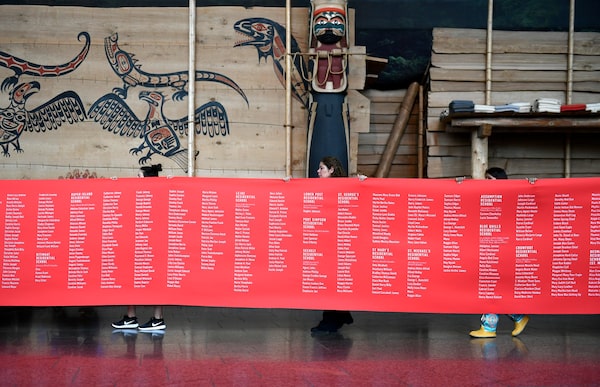
A ceremonial cloth with the names of 2,800 children who died in residential schools and were identified in the student memorial register, is carried to the stage during a ceremony in Gatineau, Que., on Sept. 30, 2019.Justin Tang/The Canadian Press
Dakota Kochie is the former chief of staff of the Assembly of First Nations and current director of government and external relations at the Nuclear Waste Management Organization.
The National Day for Truth and Reconciliation – a new federal statutory holiday on September 30 – couldn’t have come at a more needed time as Canada works to reconcile with Indigenous Peoples.
This past year, with the latest findings of unmarked graves at residential schools across Canada, Canadians have had to grapple with an uncomfortable clash between what many Canadians think happened and what Indigenous Peoples know happened in these so-called schools. Indigenous children were forcibly removed from their homes, sexually assaulted, beaten, were not allowed to speak their language and faced many other forms of abuse. They also produced death: the Truth and Reconciliation Commission (TRC)’s conservative estimate of the total deaths was more than 4,100 children.
While we likely won’t ever know the full extent of the details of the many horrors children faced in these schools, one would need not look any further than the work the TRC did to find the truth and recommend what Canada needs to do to achieve true reconciliation. After six years and thousands of testimonies by Indigenous Peoples, the TRC released their final report in 2015. One of its 94 Calls to Action, specifically number 80, called for the federal government to establish “a National Day for Truth and Reconciliation to honour survivors, their families and communities, and ensure that public commemoration of the history and legacy of residential schools remains a vital component of the reconciliation process.”
The holiday that has followed from this call needs to be a day of truth-telling so that Canadians can continue to reconcile with our shared dark history. The truths of abuse, death, humiliation and lost childhoods. The fact that Canadians had a better chance of surviving battle in the Second World War than children attending a residential school had here in Canada. These are the many reasons we as Canadians owe this one day to residential school survivors. Truth must come before reconciliation.
I was fortunate to have been part of a core group of people pushing the House of Commons behind the scenes to pass Bill C-5, which established the holiday. I am very thankful for the leadership of ministers Pablo Rodriguez, Mélanie Joly and Steven Guilbeault for their championing of this important Call to Action in Parliament. But there’s someone else that all the thanks in the world should go to: Phyllis Webstad.
If you don’t know who Phyllis is, you should spend the holiday reading about her decades of work and advocacy on behalf of residential school survivors. She is the founder of Orange Shirt Day, which has been held on September 30 of every year since 2013. Orange Shirt Day was established to commemorate the many harms and abuse residential school survivors experienced, including her own.
At the age of six, Phyllis was to attend the St. Joseph’s Mission Residential School, and in anticipation, went shopping for new school clothes, just like any other child would. She was excited to buy a brand-new orange shirt for school! But once she showed up to school, all the students were made to strip and all their clothes were taken away. She and the other children were heartbroken. Even on the first day of school, the young children were humiliated and forced to assimilate at the hands of Roman Catholic Missionaries. Imagine being away from family and having to deal with this alone at the age of six.
I remember having conversations with the federal government about what day the new statutory holiday should fall on. The government was torn between June 21 on National Indigenous Peoples Day or September 30 on Orange Shirt Day. After many conversations between the federal government, Indigenous leaders and Ms. Webstad, it was determined that it would not be June 21. That date is a celebration of Indigenous Peoples’ successes and culture, which is not the purpose envisioned for the holiday. I’m thankful that the Liberal government listened to residential schools survivors.
As a proud Anishinaabe man from Pinaymootang First Nation, I am urging Canadians to take an hour on the holiday to learn about residential schools, support Indigenous organizations who are advocating for change, be an ally by donating your time and resources to Indigenous-led causes. Most importantly: commit to holding our governments accountable on their promises on reconciliation. Reconciliation won’t happen overnight, but your support and actions mean the world to the more than 1.7 million Indigenous People in Canada.
Keep your Opinions sharp and informed. Get the Opinion newsletter. Sign up today.